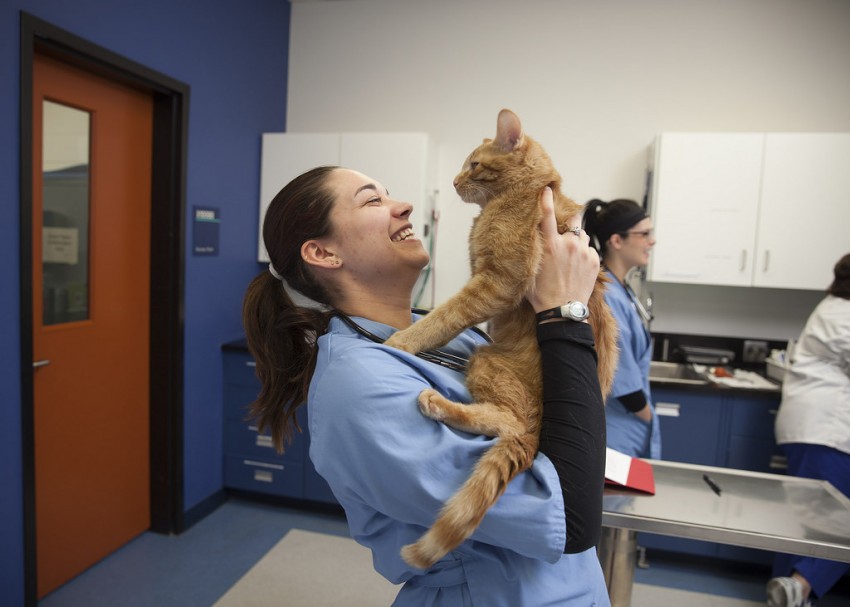
“I wish you were my doctor and not my dog’s.” Veterinarians hear this often. It makes us feel all warm and fuzzy for taking good care of your warm and fuzzies.
Last night, I had a nice phone conversation with a client I don’t know all that well. At the end of our talk, she thanked me profusely. I was calling to report urinalysis results on her little Beagle/cocker mix.
She was very appreciative because we were able to see her dog the same day she called. “I usually have to wait 2 months to see my own doctor,” she said. “And lab results in the same day? And a phone call from the doctor?” she continued. “I’m lucky if I get my own lab results back in a week. And I don’t hear from my doctor.”
Many clients appreciate the hands-on care that most veterinarians can give, a kind of care that is sometimes hard to find in human medicine. A vet visit can often be more client-friendly, more efficient and, frankly, more personal than going to a physician.
1. Quick Appointments
Take the task of scheduling an appointment for your pet versus for yourself:
- The wait for a wellness visit or an annual exam at most vets is not more than 1 or 2 weeks.
- Compare that to an appointment you book for yourself — which can take up to 6 months.
There is reportedly a shortage of primary care physicians in this country. This shortage, coupled with the ever increasing specialization of medicine, makes working within the human medical system a challenge.
2. More Efficient
Most well-equipped veterinary offices offer your pet one-stop medical service. Bloodwork, X-rays, dental procedures, surgery, prescriptions and more are all done under one roof by the same staff.
Your pet receives a similar medical “workup” to your own in a fraction of the time:
- Say your pet is in for a wellness visit that might require a heartworm test for Biff or a feline leukemia test for Mittens. The blood is taken right away, and your results are ready in a few minutes. Often, it is all done in front of your eyes by your vet.
- For your own blood tests, you may have to go to a distant lab on a different day in a different building, see an unknown phlebotomist and wait for a letter in the mail about your results.
What if Biff or Mittens comes in for a “sick” visit? Full bloodwork and X-rays are generally done in-house. Results are ready in a few hours. Even if bloodwork is sent out, veterinary turnaround is usually no more than 24 hours for most test results.

3. Personal Attention
Veterinary clients are used to seeing the same faces, getting questions answered quickly and even refilling prescriptions without a wait.
- Can you walk into your doctor’s office and say this? “You know, that little blue and green capsule I’m taking? Not the little white ones but the turquoise one. I need some more.”
- Usually, your veterinary staff can quickly identify the blue-green mystery medicine your dog is taking and get you an answer.
And what about food? So many clients come in and say to my receptionist: “You know that special food he has to eat. I need a bag.” Well, no, the receptionist may not know what your pup has been prescribed, but she should have the answer in about 20 seconds. “Whitefish and Potato” coming your way, Ms. Mittens.
4. Specialized Care
Human medicine is intensely specialized. Veterinary medicine becomes more specialized every year, but your regular veterinarian still provides many more medical services than your family physician.
Most vets put on the hats of internist and general surgeon in a normal day, not to mention ophthalmologist, dermatologist, oncologist, radiologist, allergist, podiatrist, ER doc, hospitalist and dentist.
What if your pet does need a referral? The process is often more streamlined for your pet than for yourself:
- In many areas of the country, it is fairly simple to get your pet in to see a specialist very quickly.
- This is not always true with people. One of my biggest surprises when it came to caring for my aging parents was the long wait to be seen by specialists and the doctors’ lack of concern for their patients’ time or disabilities.
My mom was diagnosed with a serious cancer, but her first appointment with an oncologist was not for a month. I was dumbfounded. Usually we have cancer in a dog or a cat staged and biopsied within 1 or 2 days of discovering the tumor.
Dragging my tired and sick parents in and out of doctors’ offices — knowing how uncomfortable they were as we sat in ERs for hours, shuffling back and forth to other facilities for tests and procedures — made many parts of modern medicine seem barbaric to me.
Sometimes, the humanity seemed to be missing from human medicine.
Let’s hope veterinary medicine retains some of its hometown feel and personal service, even as it becomes more and more specialized. I wish human medicine could retain some of that hometown doctor stuff. Being sick is tough enough. Being a sick number in a hard-to-negotiate system is even tougher.
This pet health content was written by a veterinarian, Dr. Debora Lichtenberg, VMD. It was reviewed for accuracy by Dr. Pippa Elliott, BVMS, MRCVS, and was last updated Dec. 17, 2018.



